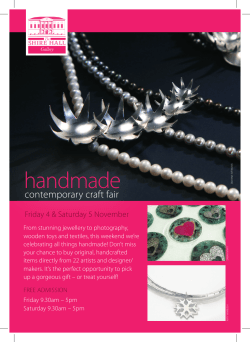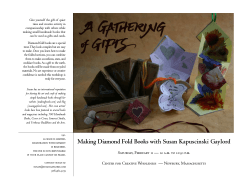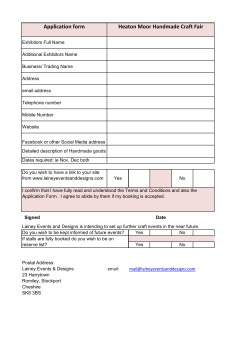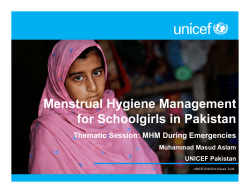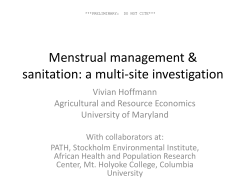
2012 Training on Low Cost Sanitary Pad (Handmade) Production
2012 Training on Low Cost Sanitary Pad (Handmade) Production IRSP-Pakistan 3/4/2012 ~2~ Background: In Pakistan, the subject of menstrual hygiene Managment is out of place at all levels of society from home to government, if we do not find any specific care on family level in majority of house hold for girls during menstruation on the other hand federal sanitation policy does not address MHM in specific manner. Lady health workers, the basic unit in Pakistan, are not given any exclusive training on MHM by government. Branded sanitary pads are too expensive to afford by common women in result majority of them use unhygienic materials. Keeping all this in view it has been strongly-willed to design trainings on menstrual hygiene management and introduce low cost sanitary pads that can be prepared and used easily without any financial hurdle by women of all ages, areas and social set ups to fulfill their needs. Objectives of the training were; 1. To encourage low cost sanitation technologies in Pakistan, 2. To generate acceptability in community for handmade sanitary materials, 3. To include women from excluded community in a development process, 4. To improve Menstrual hygiene practices in district Mardan especially in women of excluded communities, Location: Trainings were conducted in a small community, comprised of 20 households, located in the premises of DHQ, Mardan, (hospital) . Audience: 32 women of different ages, from 14 to 45 participated in the training; there were married, unmarried, housewives, working women and students in the audience. The Training: Training was comprised of 3 different sessions that were interlinked; 1. Introduction of IRSP and objectives of the training, ~3~ 2. Interactive session on Menstrual Hygiene Management, 3. Handmade Sanitary pad production Introduction of IRSP objectives of the training and Interactive session on Menstral Hygiene Management Handmade production Sanitary pad ~4~ Attendance: After introduction of the trainers and participants, participants register their participation on attendance sheet. Introduction: Though participant are well aware of the organization as IRSP has been working in the community for last one year but formally introduced by one of the facilitators. Objectives of the activity were explained as MHM is one of the most neglected issues worldwide especially in developing countries like Pakistan so IRSP decided to work on it in district Mardan. Importance of low cost MHM technologies was also highlighted. Interactive menstrual management: session on hygiene An interactive session was conducted with the participants for brain storming, they were asked different questions on the topic and they shared their experiences with each other, discussed their practices. The session worked as an ice breaker between participants and the team. ~5~ Handmade production: sanitary pad last but the most important session was on sanitary pad preparation, first the material was presented there in order to make the participants familiarize with it, material includes 1. Cotton, 2. Plastic sheet, 3. Thread, 4. Clean cotton cloth, 5. Needles for stitching. 6. Seizers for cutting clothe in to two pieces. The process was, First of all, square piece of clean and cotton cloth should be cut into two pieces of equal length and width, one need to be folded in shape of pocket placed in mid of the other piece and then stitched from all four sides. This is the most basic type which is recommended for younger and newly adult girls. In the next step they were instructed to prepare a pad with cotton and plastic sheet, both elements are kept in the folded piece of cloth this is the improved form of the previous one. This one can be proved as better absorbent. Group activity: One group activity was planned for the participants, in which they prepared sanitary pads themselves with the help of material provided to them by IRSP. After this activity they understood very well that how to prepare a pad. ~6~ Feedback from the participants: All participants gave very encouraging response to IRSP team; that they will not just prepare such pads in their homes but also convey the process to their friends and relatives. Working women appreciated the effort and told that they will present it at their workplace especially those who are hospital employees. Conclusion of the training: After all sessions, feedback training concluded with the vote of thanks by the trainer with the hope of more progress on MHM. Participants also paid their gratitude for such informative and fruitful training and requested for more discussion on the topic in future. Lesson learnt during the training: As there are huge strengths of students in girls’ schools and all of the students cannot attend the training at the same time so; 1. There should be more advanced refresher courses for trainers also. 2. Process of handmade sanitary pad preparation should be presented in pictures in form of a small booklet 3. Active women from communities should be selected, further trained and organized in form of youth groups and women groups so that they can work in their areas for improvement of MH practices and pad production. ~7~ Training Agenda Preparation of Handmade low cost sanitary pads Time Activities Responsible 2:00_____2:05 Recitation Participant 2:10_____2:20 Introduction Participants + facilitators 2:25_____2:45 Introduction of the project facilitator 2:50_____3:20 Menstrual hygiene management Handmade sanitary pads preparation Interactive session Group Work Participants 3:21_____3:45 3:46______3:00 Conclusion facilitator
© Copyright 2025

